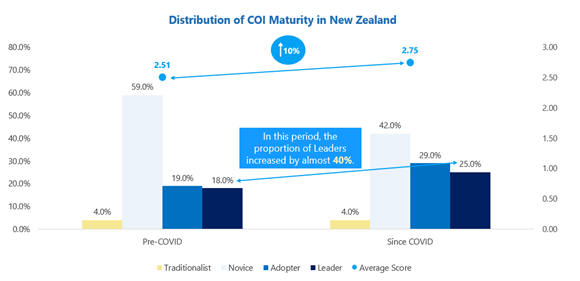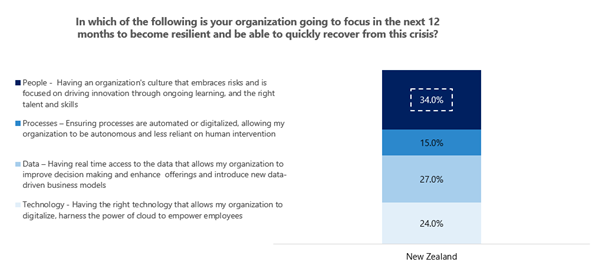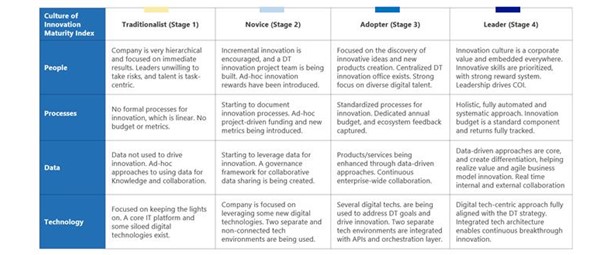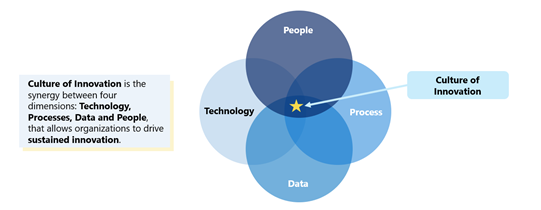- 88% of business decision-makers in New Zealand say innovation is a ‘must’, not just good-to-have; they see the ability to innovate as vital to performance and resilience[1]
- 25% of organisations in New Zealand are leaders[2] in a culture of innovation, exceeding the Asia Pacific average of 8%
- Since COVID-19, New Zealand organisations have matured in a culture of innovation by 10%, increasing their ability to innovate; 58% of these organisations now find innovation easy
- 62% of organisations in New Zealand are accelerating their pace of digitalisation in response to the crisis
New Zealand, 13th October 2020 – New research from Microsoft and IDC has found that sometimes crisis can be an opportunity. As New Zealand continues to deal with disruptions resulting from the Covid-19 pandemic, 88% of business decision-makers say innovation is now a ‘must’ for them to respond quickly to market challenges and opportunities and ensure business resilience.
In a short span of six months, the proportion of New Zealand businesses who are leaders2 in a culture of innovation increased by almost 40% from pre-COVID times. Currently, 25% of organisations are leaders, significantly higher than the Asia Pacific average of 8%. Additionally, 62% of New Zealand organisations are speeding up digitalisation to adapt to the new reality – from launching digital products and introducing digital payments, to embracing ecommerce and automation.
“Innovation is no longer an option, but a necessity. We’ve seen how the recent crisis spurred transformation across the region, and organisations will have to integrate the ability to innovate into their core, to recover,” said Russell Craig, National Technology Officer, Microsoft New Zealand. “Organisations in New Zealand have realised how much their ability to innovate fuels their performance and business resilience during the crisis. Since COVID-19, 58% of organisations in New Zealand have found innovation to be easier. This demonstrates how firms are embracing a culture of innovation to become more mature and accelerate their transformation. What is exciting is that, as New Zealand’s access to world leading technology increases, like Microsoft’s datacenter region in Aotearoa, we think New Zealand businesses are well-positioned to become innovation leaders and drive further economic growth for the country,” explained Russell.
Fig 2: Growth in Culture of Innovation Maturity in New Zealand (%)
The study found that in the span of six months, organisations in New Zealand have matured in a culture of innovation by 10%, however while this is a step in the right direction, when compared to innovation leaders, we are still behind. Demonstrating their stronger propensity for resilience and adaptability, 40% more innovation leaders in Asia Pacific, as compared with organisations in New Zealand, expect an increase in their revenue and one in three of them expect to increase their market share despite the crisis.
The study also revealed that while significantly more organisations in New Zealand found innovation to be hard (85%) before COVID-19, they have since shifted perceptions with less New Zealand organisations (42%) and leaders (36%) adopting this sentiment now. This is an effect of having been forced to accelerate innovation in response to disruptions in the market.
Moving forward, both organisations in New Zealand and innovation leaders in Asia Pacific say they will prioritise skilling, while leaders also plan to focus on investing in technology infrastructure that is robust and allows scalability and flexibility. This is already being implemented, with Microsoft recently announcing a global skilling initiative that aims to bring digital skills to 100,000 New Zealanders by the end of the year.
“We see amongst leaders a constant appetite for growth and evolution. During COVID-19, 45% of them said they think their business model will lose competitiveness in five years’ time, as compared to 32% of firms in New Zealand. This desire and urgency for continuous improvement through agility and adaptation to change will determine the success of businesses in this new normal,” said Craig
Focus on people in New Zealand
Organisations in New Zealand were found to perform better than their Asia Pacific counterparts in all aspects of a culture of innovation, with technology as their strongest dimension. When asked about their priorities for the next 12 months, they indicated that they will focus on people (34%) as the most essential for business resilience and recovery.
Fig 3: Technology and People as the two focus areas for organisations in New Zealand (%)
“It is encouraging to see business leaders in New Zealand recognise that focus on people and culture, in addition to technology, is crucial to drive sustained innovation and realise the digital transformation ambition,” said Craig. “Achieving success in digital transformation requires both the adoption of tools and technologies as well as own people’s capabilities – what we term as tech intensity – a critical component of the culture of innovation.”
Using the culture of innovation framework, the study revealed the successful formula to help a company to foster a culture of innovation, and it comes in four parts – fortify resilience with technology, invest in skilling, leverage data to increase competitiveness and redesign processes to empower people.
“It’s imperative that people are equipped to collaborate and encouraged to drive sustained innovation. Our goal is to realise an inclusive future where all organisations in New Zealand are dynamic and resilient – to recover well and thrive despite the crisis. At Microsoft, we are committed to working with organisations in New Zealand to make this happen, together,” concluded Craig.
-ENDS-
About the research
The research was conducted by IDC and completed in two separate phases, pre-COVID and post-COVID. Over 3400 workers and business decision makers were interviewed globally for phase one, then an additional 3300 workers and business decision makers were interviewed for phase two. In New Zealand 217 business decision makers and workers were interviewed for phase one, with an additional 200 workers and business decision makers being interviewed for phase two.
About Microsoft
Microsoft (Nasdaq “MSFT” @microsoft) enables digital transformation for the era of an intelligent cloud and an intelligent edge. Its mission is to empower every person and every organisation on the planet to achieve more. For more news and information, visit https://news.microsoft.com/en-sg/.
For more information, please contact:
| Microsoft New Zealand
Hayley Smith M +64 21 049 8945
|
APPENDIX
Appendix: Stages of Culture of Innovation
Culture of innovation – a success formula for resilience and faster economic recovery
Using the culture of innovation framework, the study revealed the best practices that organisations can adopt to progress across people, technology, data and process.
Specifically, organisations are encouraged to:
- Fortify resilience with technology
Strengthen the organisation’s approach to digital transformation through resilient technologies allowing simplification, flexibility and agility – cloud, artificial intelligence and machine learning. At the same time, ensure that cybersecurity is infused into the organisation’s digital footprint.
- Invest in people’s capabilities and skills
Create open and inclusive environment to attract the best and diverse talent. Integrate workplace innovation efforts that will be crucial to accelerate transformation, ensuring the right rewards and incentives to encourage innovation and upskilling to sustain the pace of innovation, by unlocking people’s capabilities.
- Leverage data to increase competitiveness
Capitalise on the value of data through developing new data-driven products and services and revenue streams for organisation’s competitiveness. It will be key that data-driven insights are leveraged for enterprise-wide collaboration and decision-making to institute a knowledge sharing culture.
- Redesign processes to empower people to continuously drive innovation
Create a systematic approach to drive innovation – from ideation to commercialisation and establish a centralised digital transformation budget, along with digital KPIs. Customer centricity should be at the heart of continuous improvements, and a feedback loop is necessary to capture learnings on an ongoing basis.
Appendix: Culture of innovation – a success formula for resilience and faster economic recovery
Assessing organisational maturity for culture of innovation
The study introduced the culture of innovation framework, which captures organisations’ approach to innovation. Through the research, organisations’ maturity was mapped against four dimensions – people, processes, data, and technology. As a result, organisations were grouped in four stages – traditionalist (stage 1), novice (stage 2), adaptor (stage 3) and leaders (stage 4). Leaders comprise of organisations that are the most mature in building a culture of innovation[3].
Fig 1: Culture of Innovation Framework
Appendix: Conduction
[1] Research background for Culture of Innovation: Foundation for business resilience and economic recovery in Asia Pacific:
- The study was conducted in two phases – Phase 1 (Pre-COVID; Dec 2019-Jan 2020) and Phase 2 (Since COVID-19; July 2020). Phase 1 – 1,622 business leaders and 1,823 workers (100 business leaders and 117 workers in New Zealand) participated; Phase 2 – 1,690 business leaders and 1,672 workers (100 business leaders and 105 workers in New Zealand) participated. Participants from organisations with more than 250 staff were polled.
- 15 Asia Pacific markets were involved: Australia, China, Hong Kong, Indonesia, India, Japan, Korea, Malaysia, New Zealand, Philippines, Singapore, Sri Lanka, Taiwan, Thailand, and Vietnam.
[2] Leaders, or leading organisations, comprise 8% of all organisations surveyed – they fall into the most mature stage (Stage 4) of the culture of innovation model comprising the areas of people, process, data and technology
[3] Please refer to Appendix for full framework





